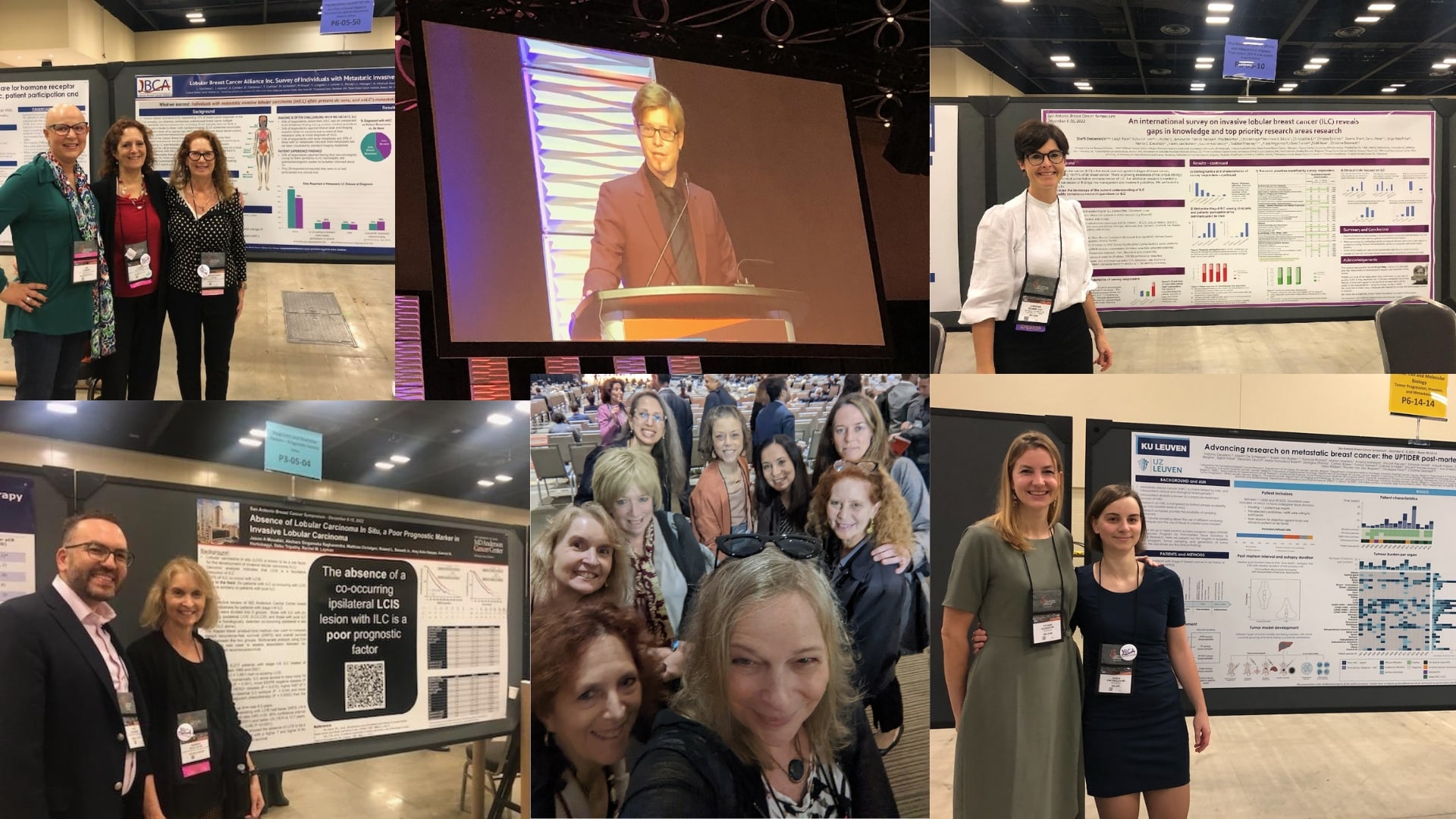Invasive lobular carcinoma (ILC) research and ILC patient advocates made their mark on this year’s San Antonio Breast Cancer Symposium (SABCS) held December 6 – December 10, 2022. Occurring annually, SABCS is the largest and most prestigious breast cancer conference in the world.
Lobular breast cancer was the topic of more than 20 general and spotlight research poster sessions. These posters (and all posters presented) and accompanying abstracts will be published in a special SABCS22 journal early next year. (It should be noted that in most cases, the studies presented in posters will only be published as manuscripts in other journals after going through the peer review and revision process in the journals that accept them. It is therefore important to view the poster presentations as promising research and not yet works from which to draw definitive conclusions). Here are some of the highlights relating to ILC research discussed during poster and other sessions at SABCS22:
- The Lobular Breast Cancer Alliance’s (LBCA) poster titled Lobular Breast Cancer Alliance Inc. Survey of Individuals with Metastatic Invasive Lobular Carcinoma shared the results of our survey last spring of individuals living with metastatic ILC. Survey findings about patient experiences bore out the impression that there is a high proportion of de novo metastatic diagnoses and that metastatic ILC is difficult to monitor with imaging. Other important findings include that over 50% of respondents noted that primary care and other non-oncology caregivers need to have more information about lobular breast cancer and that some respondents report a change in the receptor status of their tumors with progression. Next step recommendations include: more study comparing rates of progression and on receptor status changes is warranted; and more education about the unique qualities of ILC should be conveyed to non-oncological clinicians.
- LBCA was a co-author of another poster titled An international survey on invasive lobular breast cancer (ILC) reveals gaps in knowledge and top priority research areas. The study presented in this poster entailed a survey of 1,774 individuals across 66 countries in three groups: clinicians/researchers, laboratory-based researchers, and advocates/patients. The intent was to determine the landscape of the current understanding of ILC and what the priority ILC research questions are for each group of respondents. The study, led by founding LBCA Scientific Advisory Board (SAB) Chair Dr. Steffi Oesterreich, was a collaboration among multiple research institutes and ILC advocacy groups, including LBCA, across the world.
Key results included that there is close agreement among clinicians (mostly oncologists and surgeons) and laboratory researchers on the top two ILC research priorities: 1) determining mechanisms of endocrine resistance, and 2) identifying novel therapeutic targets, repurposing existing drugs and progressing them to ILC-focused clinical trials. Strikingly, less than 50% of respondents in both groups reported being confident in describing differences between ILC and breast cancer of no specific type (previously referred to as invasive ductal carcinoma).
The majority of patients thought that their providers did not provide enough information about the unique features of ILC. Patients’ research priorities were: 1) improvement of ILC screening/early detection and 2) identifying new and specific imaging tools for ILC. LBCA will be collaborating with the other poster authors on developing multi-center research studies and clinical trials in these priority areas in the future.
- There was one educational session in the main conference that included a segment on ILC titled Challenging Types of Breast Cancer. It featured SAB member Dr. Jorge S. Reis-Filho discussing pathology and Dr. Sibylle Loibl from the German Breast Group discussing lobular/pleomorphic breast cancer.
- The need for more lobular breast cancer research was a prominent feature of the Year in Review wrap-up on the last day of the conference. With not one regular or spotlight session dedicated to ILC, we were glad to see the slide in the wrap-up session proclaiming: “the year in review should always include a section on ILC” and lamenting the still problematic fact that there are no reports on clinical trials for ILC. We agree with the conclusion that this remains a real unmet, clinical need!
LBCA was well represented throughout the symposium through the attendance of many members of our Scientific Advisory Board (SAB), Patient Advocate Advisory Board (PAAB), and Board of Directors. Two of LBCA’s ILC research grantees’ work was presented as well. LBCA was also happy to be able to send three ILC patient advocates to SABCS through its ILC patient advocate scholarship program. We also scheduled two opportunities during the week for all those with an interest in ILC research to gather together informally for snacks, chats, and pictures.
Here is a sampling of the sights from SABCS22:


